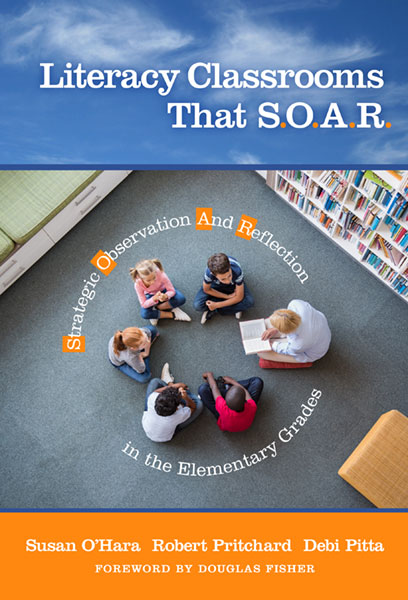Professors: Request an Exam Copy
Print copies available for US orders only. For orders outside the US, see our international distributors.
Susan O'Hara, Robert Pritchard, Debi Pitta
Foreword by: Douglas Fisher
Publication Date: November 27, 2020
Pages: 216

SOAR Teaching Frames for Literacy provides a unique approach to planning, implementing, and elevating instruction that drives improvement in teaching and learning. SOAR focuses on the high-impact teaching practices that research identifies as key to student learning. In this book, the authors present and unpack these practices within the context of Teaching Frames. The frames provide a common language and a set of tools to foster informal self-evaluation, as well as teacher-to-teacher and coach-to-teacher collaboration. All stages of implementation are illustrated with classroom examples from the authors’ 15 years of research and professional development throughout the United States. School principals, coaches, and classroom teachers can use Literacy Classrooms That S.O.A.R. to support professional learning and growth across schools and districts.
Book Features:
Susan O’Hara is former director of the Center to Support Excellence in Teaching at Stanford University. Robert Pritchard is a professor emeritus of education at Sacramento State University. Debi Pitta is vice president of professional learning for EPF for Teaching. All three are former K–12 teachers with more than 40 years of classroom experience and extensive experience supporting districts to build instructional capacity.
“(A) clear, actionable, and practical guide for teachers to increase their instruction of academic language and develop deeper and more robust literacy instruction for their students.”
—Teachers College Record
“When the SOAR Teaching Frames are adopted as a framework by schools and districts where all teachers are using them and sharing their ideas, they become a powerful tool for elevating literacy instruction for all students and as a result for improving learning outcomes.”
—From the Foreword by Douglas Fisher, professor and chair of the Department of Educational Leadership, San Diego State University
“The SOAR Teaching Frames have been an invaluable tool as we work to transform teaching practices in the Robla Elementary School District in Sacramento, California. Robla serves a community where families face the challenges of poverty every day, and nearly half of our students speak a language other than English at home. We discovered that our classrooms were filled with teacher talk and very little student talk: Our students were spending the school day passively listening, and many showed an inability to express their thoughts and ideas clearly in a conversation and writing. The SOAR Frameworks provided us with a tool to help students find their voice. High-impact teaching practices actively engage students in their learning and provide them with the skills they need to interact with each other throughout the school day in nearly all curriculum areas. They not only learn from their teachers but from each other. They are now learning to express their thinking and expand upon the ideas of others. Classrooms are now filled with many points of view and more high-level thinking. Our entire school system is more coherent as these teaching practices have become part of the school day in all grades.”
—Ruben Reyes, superintendent, Robla Elementary School District, Sacramento, CA
“The SOAR Teaching Frameworks support educators in thinking about how academic language instruction is fundamental to content development. For teachers of English Language Learners, the SOAR frames allow us to move beyond simplistic conversations about vocabulary and scaffolds, and to think deeply about how teachers orchestrate academic conversations and how instruction can contribute to student agency and learning. Significantly, these frames, when used by a school staff or school district, can be a critical tool in developing an intellectual and professional school culture that understands reflection as a part of daily planning and teaching. A must-read for all teachers, and especially for teachers of English Language Learners. ”
—Isabel Aguirre, K–12 EL Expert, Los Angeles Unified School District
Contents
Foreword Douglas Fisher vii
Acknowledgments ix
1. Introducing the SOAR Teaching Frames 1
A Research-Based Approach to Elevating Instruction 2
Elevating Teaching Practice in Support of New Standards 3
Step Inside Ms. Aguirre’s Classroom 3
Step Inside Ms. Rahim’s Classroom 5
The SOAR Practices 7
SOAR Teaching Frames 10
Findings From Our Work in the Field 12
Conclusion 14
2. Disciplinary Discussions 15
Using the SOAR Lens to Plan and Reflect 16
Step Inside Ms. Vu’s Classroom 24
Implementing the Disciplinary Discussions Teaching Frame 29
Additional Implementation Considerations 49
Conclusion 51
3. Disciplinary Interactions With Complex Text 52
Using the SOAR Lens to Plan and Reflect 52
Step Inside Mr. Ortiz’s Classroom 60
Implementing the Disciplinary Interactions With Complex Text Teaching Frame 65
Additional Implementation Considerations 86
Conclusion 87
4. Disciplinary Uses of Evidence 89
Using the SOAR Lens to Plan and Reflect 89
Step Inside Mr. O’Connor’s Classroom 96
Implementing the Disciplinary Uses of Evidence Teaching Frame 102
Additional Implementation Considerations 120
Conclusion 122
5. Disciplinary Communication 123
Using the SOAR Lens to Plan and Reflect 123
Step Inside Ms. Alvarez’s Classroom 131
Implementing the Disciplinary Communication Teaching Frame 134
Additional Implementation Considerations 156
Conclusion 158
6. Supporting Teachers to Build Literacy Classrooms That SOAR 159
Fostering an Ability to Teach with Metacognition 160
Supporting the Collective Growth of Teachers Through Professional Learning Communities 163
Step Inside Rockville School 165
Building a Culture of Professional Growth Districtwide 167
Step Inside South End School District 167
Conclusion 170
Appendix A: Conversation Prompts and Responses 172
Appendix B: American Symbols 173
Appendix C: Buffalo Soldiers 174
Appendix D: Formative Assessments of Student Talk—Disciplinary Discussions 176
Appendix E: Formative Assessments of Student Talk—Disciplinary Communication 178
Appendix F: Implementation Rubric—Disciplinary Discussions Teaching Frame 180
Appendix G: Implementation Rubric—Disciplinary Interactions With Complex Text 185
Appendix H: Implementation Rubric—Disciplinary Uses of Evidence 186
Appendix I: Implementation Rubric—Disciplinary Communication 187
References 189
Bibliography 193
Index 195
About the Authors 203
Professors: Request an Exam Copy
Print copies available for US orders only. For orders outside the US, see our international distributors.